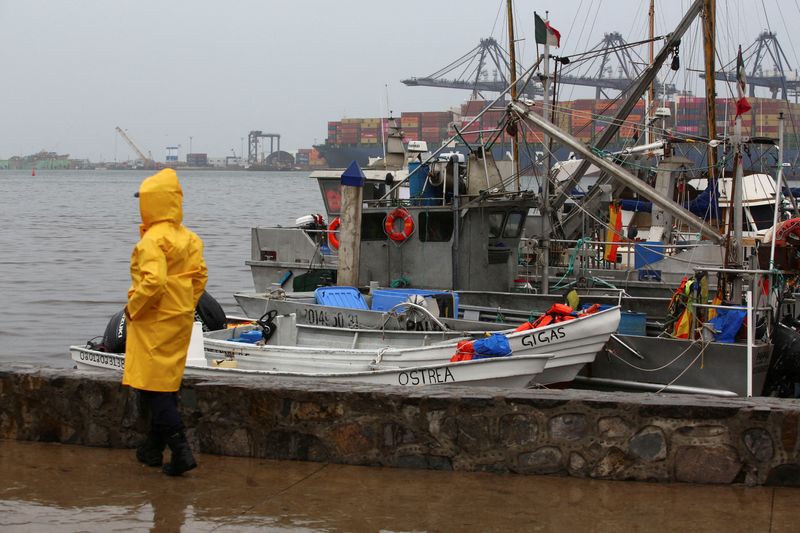By Howard Schneider
JACKSON HOLE, Wyoming (Reuters) - Record levels of government debt, geopolitical tensions that threaten to split the global trading system, and the likely persistence of weak productivity gains may saddle the world with a slow-growth future that stunts development in some countries even before it starts.
That sobering view of a post-pandemic global economy emerged from research organized by the Kansas City Federal Reserve and debated here this past weekend. It explored issues like the outlook for technological innovation, public debt, and the state of international trade at a time when the Russian invasion of Ukraine and conflict between the U.S. and China have eroded a once-broad global agreement, at least in theory, to boost the free flow of goods and services.
"Countries are now in a more fragile environment. They've used a lot of their fiscal resources to deal with a pandemic...Then you have policy-driven forces, geoeconomic fragmentation, trade tensions, the decoupling between the West and China," International Monetary Fund chief economist Pierre-Olivier Gourinchas said in an interview on the sidelines of an annual Fed conference here. "If we get to a point where part of the world is stuck without catching up and has large amounts of population, that creates tremendous demographic pressures and migration pressures."
Gourinchas said it is possible that global growth settles into a trend of around 3% annually, a figure far below rates above 4% seen when rapid advances in China's economy drove global output higher and which some economists consider borderline recessionary in a world where quick gains should still be achievable in large, less-developed countries.
But in the emerging pandemic economy, "the global growth environment has become very challenging," said Maurice Obstfeld, a former IMF chief economist and now a fellow at the Peterson Institute for International Economics in Washington.
China is now suffering what may be chronic economic problems along with a shrinking population. Emerging industrial policies in the U.S. and elsewhere are reordering global production chains in ways that may be more durable or serve national security ends, but also be less efficient.
The symposium is among the first major attempts to take stock of longer-term economic developments after the pandemic and amid renewed geopolitical tensions after years in which officials were at first preoccupied with fighting COVID-19 itself, then had to focus on a global breakout of inflation.
Economists and policymakers here appeared in rough consensus that two trends from before the pandemic, both with global-growth implications, had been intensified by the health crisis and other recent events.
After rocketing higher during the Global Financial Crisis 15 years ago, the ratio of public debt to world economic output has grown to 60% from 40% thanks to pandemic spending and is likely now at a level where serious debt reduction is not politically feasible, Serkan Arslanalp, an economist at the International Monetary Fund, and Barry Eichengreen, an economics professor at the University of California, Berkeley, wrote in a paper.
The implications of public debt that is "here to stay" varies by country, they said, with higher-debt but higher-income nations like the U.S. likely able to muddle through over time, while smaller nations perhaps face future debt crises or binding fiscal constraints.
Globally the fallout could be severe if public borrowing steers capital from countries that still have growing populations and less developed economies, said Cornell University economics professor Eswar Prasad.
"This puts us in a bleak setting, thinking about the parts of the world that are labor rich but capital poor," he said. While the populations of major European nations, Japan, China and the U.S. are all aging, some African nations like Nigeria continue to grow fast.
'A MORE NAIVE TIME'
The other pre-pandemic trend that has endured and intensified is a rising openness to policies that range from the outright protectionist tariffs imposed under former U.S. President Donald Trump to Biden administration efforts to steer production of things like computer chips back to the U.S.
White House Council of Economic Advisers Chair Jared Bernstein said at the symposium Biden administration industrial policies weren't necessarily tilted either for or against more international trade, since many of the intermediate goods needed to make silicon chips, for example, would be imported.
"In my view the strategies we are pursuing despite a lot of heated rhetoric implies neither more nor less trade," Bernstein said during one discussion.
Others noted the Russian invasion of Ukraine, and the fast follow-on divorce of the European power grid from Russian energy, fractured one of the key precepts behind the spread of globalization: Trade would create durable partnerships, if not outright allies.
"I do remember a time, maybe a more naive time...when more trade would create friends," said Ben Broadbent, deputy governor of the Bank of England.
But World Trade Organization Director-General Ngozi Okonjo-Iweala said while the pandemic raised reasonable issues around global supply resilience, particularly for sensitive items like pharmaceuticals, the move to reorder global production patterns risked leaving growth opportunities on the table.
"From a political point of view you can understand how attractive it is to say we see the vulnerabilities so we are going to try to do business with those who have the same values as we do," she said. But whatever the strategy - "nearshoring," "friendshoring," "reshoring" - she argued that "maybe you need to go a little bit further...If you are going to diversify anyway...spread it to those who have been at the margins of the global system."
"Friends," she noted, can change, a pointed statement at a time when Trump, who aimed tariffs at Europe, is running again and recently raised the idea of an across-the-board tax on imports.
If there was a potential bright spot, it was around the discussion of advances in artificial intelligence as a possible driver of higher productivity.
Yet even that was weighed against the possible damage the technologies may do, and against research findings showing innovation was getting exponentially harder.

Even beyond that, any benefits may be slow in coming.
"I think of ChatGPT like Peloton (NASDAQ:PTON)," said Nela Richardson, chief economist for payroll processor ADP, comparing the AI innovator with the maker of upscale exercise bike systems. "You can put as many as you want in a home office. If doesn't mean people are going to use it."
